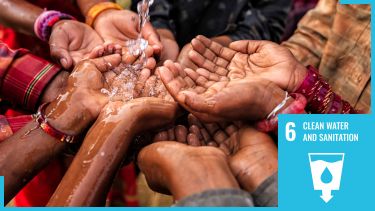SDG6: Clean Water & Sanitation
As a human right, everyone should have access to clean water and sanitation. Actions such as providing education around sustainable water use, preventing water pollution and ensuring water security for all, enables clean water and sanitation accessible to everyone.

Key facts for how we are achieving SDG 6
- 372,808.072m3 of water used in the University in 2022, equating to 9,900L per student or staff member
- Free water refill stations are available in every building on campus for students, staff and visitors, with the Students’ Union refusing to sell still bottled water to incentivise refill bottles
- Ambitious water usage targets for new and refurbished buildings of 0.5m3 of water per m2 of building per year for academic buildings and 100 L of water per person per day for residential buildings; exceeding the UK governments' water usage target of 110L per person per day by 2050.
- Plants used in University landscaping are specially selected to be less water thirsty such as drought tolerant plants
Research
Solving Water Complaints
Water discolouration is the biggest cause of calls and complaints to water companies in the UK. Researchers at the University of Sheffield have identified a major cause of water discoloration and worked with water companies to develop strategies to combat it by changing operational procedures.
Treating water discolouration by adapting water transport procedures fixes the issue without the need for expensive and disruptive maintenance work on water pipes, improving water service delivery and saving over £411 million so far. The methods developed can also be applied outside of the UK, improving water service delivery globally.
Global Water Infrastructure
The University of Sheffield is part of a research centre that is partnered with the African Research Universities Alliance Water Centre of Excellence, a group of nine universities from across Africa that are working to improve water infrastructure. By partnering with this institution, university research on expanding and consolidating water infrastructure across Africa can be informed by real stakeholders. In turn, local communities and governments are left with the tools to continue building sustainable water infrastructure themselves.
Pipe Dreams
The Pipe Dreams project linked up engineers, computer scientists and microbiologists to develop analytical and predictive tools relating to water distribution systems. A unique pipe loop test facility, molecular microbial analysis techniques and Artificial Intelligence were combined to create models of how physical, chemical and biological processes occur in water distribution systems. These models can then be used to predict how changes to distribution systems will affect water quality.
Partnerships
Water Centre
The University of Sheffield Water Centre is part of a group collaborating on the WeSenseIt project. In this project, locals use smartphone apps to help collect real-time data about the water environment in their area. WeSenseIt provides researchers with vital data on how water quality varies with weather and seasons, and encourages local people to think about and discuss their local water environment with one another.
